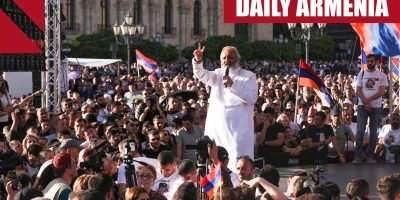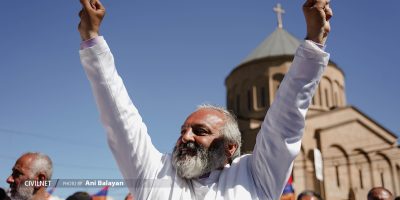By Mark Dovich
As the world grapples with the ongoing spread of the novel coronavirus, it also faces a parallel surge in misinformation, fake news, and conspiracies theories about the virus. In recent months, the Chinese, Russian, and U.S. governments have openly promoted coronavirus-related conspiracy theories for political gain. Meanwhile, the proliferation of fake news about the disease continues to accelerate on social media networks and other platforms.
Armenia has been far from immune to these developments. At present the country faces not only an ongoing public health emergency and an economic crisis, but also a flood of fake news and a rise in far right activity, both of which predate the appearance of the disease in the country earlier this year. Together these factors have created fertile ground for coronavirus-related conspiracy theories to take root in Armenia.
These fake news stories and conspiracy theories come from numerous sources. Aside from social media posts by ordinary citizens, coronavirus-related misinformation in Armenia has been linked to media organizations and civil society groups associated with the country’s prerevolutionary political elite, the Russian government, and the U.S. government.
Though numerous fake news stories about the virus have proliferated in Armenia, several have become quite widespread. One line of thought, for instance, holds that every Armenian man is “healthy and strong” and is therefore immune to the coronavirus, ignoring longstanding health issues among this segment of the population, including obesity and high smoking rates.
Other conspiracy theories target the government for alleged wrongdoing and cover-ups. One news story inaccurately claims that the Armenian government is actually paying citizens to contract the coronavirus—ostensibly in an effort to inflate the number of reported cases and thereby attract more international aid. A similar conspiracy theory alleges that the Armenian government has been offering money to relatives of the deceased if they report their loved ones’ cause of death as coronavirus—again, supposedly, to raise more aid.
The state-run National Center for Disease Control (NCDC) has also emerged as a frequent target for misinformation in Armenia. Numerous articles published in recent weeks falsely suggest that the coronavirus is a man-made biological weapon that was accidentally or purposefully disseminated in Armenia through NCDC facilities.
The claims leveled against Armenia’s NCDC, which have appeared primarily in Russian government-linked media platforms, echo similar allegations long made by the Kremlin that the Richard Lugar Center for Public Health Research, a U.S. government-funded laboratory in Tbilisi, serves as a base in Georgia for the U.S. to launch biological weapons at Russia.
Coronavirus-related misinformation has even been promoted by Armenian government officials themselves. In one noteworthy case, Armenian Health Minister Arsen Torosyan accused the Georgian government of both underreporting coronavirus-related deaths and purposefully testing at low rates in an effort to artificially lower the number of confirmed infections in Georgia.
Though the Armenian Health Ministry later apologized on Torosyan’s behalf, his remarks reflect a widespread conspiracy theory in Armenia that Georgia, which has reported dramatically fewer cases than Armenia, is covering up the true number of infections.
Other conspiracy theories that have gained widespread attention around the world have also made their way to Armenia. They include claims that the pandemic has been engineered by U.S. businessman Bill Gates to cover up plans to implant trackable microchips in humans; allegations that the spread of the virus is somehow connected to the construction of 5G cellphone towers across the globe; and anti-vaccination articles urging Armenians not to get vaccinated for the coronavirus if or when a vaccine is developed.
The latter conspiracy theory has been promoted by the website medmedia.am, which was recently revealed by the London-based media platform openDemocracy to receive U.S. funding. Aside from noting that “these opinions do not reflect the views of the U.S. government”, the U.S. Embassy in Yerevan has refused to comment on the matter, which has attracted attention in the international press.
Though several Armenian government officials, including Prime Minister Nikol Pashinyan, have denounced the spread of coronavirus-related fake news in the country, the government has so far refrained from taking effective steps in this regard.
In fact, a failed attempt at limiting the spread of fake news about the virus in March and April—by banning the publication of information on the disease that did not come from the Armenian government— backfired when police began requesting citizens remove social media posts critical of the government’s handling of the pandemic. Such incidents prompted a group of prominent media organizations to issue a joint statement calling the measures “ineffective, disproportionate, unreasonable, and not in the public interest.”
The explosion in coronavirus-related misinformation that Armenia now faces only further complicates an already fraught situation: media regulation of any form raises uncomfortable questions about freedom of speech and the potential abuse of regulatory laws by the government to exert political pressure.
Recently, the country has seen calls for increased media education. For instance Shushan Doydoyan, President of the Freedom of Information Center of Armenia, has stated the best way to address fake news is by promoting media literacy among the general public. In an interview with CivilNet, Armenian-American nuclear scientist Areg Danagoulian expressed similar sentiments, calling Armenia’s low levels of media education an “epidemic of ignorance.”
















